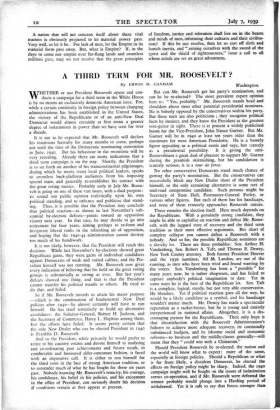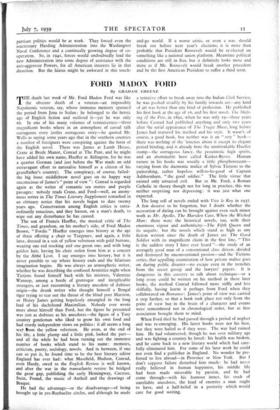A THIRD TERM FOR MR. ROOSEVELT ?
By ERWIN D. CANHAM
Washington. NVHETHER or not President Roosevelt opens and con- ducts a campaign for a third term in. the White House is by no means an exclusively domestic American issue. For, while a certain continuity in foreign policy between changing administrations has been established in the United States, the victory of the Republicans or of an anti-New Deal Democrat would almost certainly at first mean a greater degree of isolationism in power than we have seen for over a decade.
It is not to be expected that Mr. Roosevelt will declare his intentions formally for many months- to come, perhaps not until the time of the Democratic nominating convention in June, 1940. But his behaviour in the meantime will be very revealing. Already there are many indications that a third term campaign is on the way. Shortly, the President is to set forth on another of his transcontinental pilgrimages, during which he meets many local political leaders, speaks to countless back-platform audiences from his imposing special train, and generally re-establishes his contact with. the great voting masses. Probably early in July Mr. Roose- velt is going on one of these vast tours, with a dual purpose: to sound out public opinion realistically upon his own political standing, and to enhance and publicise that stand- ing. Thus, it is possible that the President may conclude that political reaction—as shown in last November's sub- stantial by-election defeats—points toward an opposition victory next year. In that case, he may decide to go into retirement for four years, aiming perhaps to re-form and invigorate liberal ranks in the refreshing. air of opposition, and hoping that the 1940-44 administration cannot destroy too much of his handiwork.
It is not likely, however, that the President will reach this decision. While last November's by-elections showed great Republican gains, they were, gains of individual candidates against Democrats of weak and varied calibre, and the Pre- sident himself was not running. Mr. Roosevelt now gives every indication of believing that his hold on the great voting groups is substantially as strong as ever. But last year's defeats showed one thing, and that is that the President cannot transfer his political mantle to others. He tried to do that, and failed.
So if Mr. Roosevelt intends to attain his major purpose —which is the continuation of fundamental New Deal policies after 194o—he almost certainly will have to run himself. He has tried tentatively to build up alternative candidates : the Solicitor-General Robert H. Jackson, and the Secretary of Commerce, Harry L. Hopkins among them, but the efforts have failed. It seems pretty certain that the only New Dealer who can be elected President in 1940 is Franklin D. Roosevelt.
And so the President, while privately he would prefer to retire to his country estates and devote himself to analysing and co-ordinating past achievements and future needs, in comfortable and honoured elder-statesman fashion, is faced with an imperative call It is either to run himself for the third term in the face of strong American tradition, or to surrender much of what he has fought for these six years past. Nobody knowing Mr. Roosevelt's tenacity, his courage, his confidence, his belief in his policies, and his enjoyment in the office of President, can seriously dbubt his decision if conditions remain as they appear at present. But can. Mr. Roosevelt get his party's nomination, and can he be re-elected? The most prevalent expert opinion here is: " Yes, probably." Mr. Roosevelt stands- head and shoulders above most other potential presidential nominees. He is bitterly opposed by the conservative& within his party. But these men are also politicians ; they recognise political facts by instinct, and they know the President as the greatest vote-getter in sight. There is at present a widely publicised. boom for the Vice-President, John, Nance Garner. But Mr. Garner will be in 1940 at least ten years older than the maximum for most American Presidents. He is a homely figure appealing as a political rustic and sage, but scarcely as a presidential possibility. It is giving the anti- Rooseveltians a great deal of pleasure to support Mr. Garner during the prankish skirmishing,, but his candidature is scarcely serious, it is a tour de force.
No other conservative Democrats stand much chance of getting the party's nomination. But the conservatives can successfully block any New Dealer short of the President himself, so the only remaining alternative is some sort of mid-road compromise candidate. Suck persons might be Secretary of State Hull, Postmaster-General Farley, or various other figures. But each of them has his handicaps, and none of them remotely approaches Roosevelt stature.
There remains the election itself. Here much depends on the Republicans. With a genuinely strong candidate, they might be able to capitalise on reaction and defeat Mr. Roose- velt, with the laggard state of recovery and the third term tradition as their most effective arguments. But short of complete collapse you cannot defeat a Roosevelt with a nobody. And so far, the possible Republican nominees are a sketchy lot. There are three probables : Sen. Arthur H. Vandenberg, Sen. Robert A. Taft, and Thomas E. Dewey, New York County attorney. Both former President Hoover and the 1936 nominee, Alf M. Landon, are out of the running, as men who have been tried and found wanting by the voters. Sen. Vandenberg has been a " possible " for many years now, he is rather shopworn, and has failed to capture anybody's political imagination to date. Yet in some ways he is the best of the Republican lot. Sen. Taft is a complete, logical, sturdy, but not very able conservative. He blunders. Yet if political reaction goes all the way, he would be a likely candidate as a symbol, and his handicaps wouldn't matter much. Mr: Dewey has made a spectacular reputation as a racket-buster, but he is young and entirely inexperienced in national affairs. Altogether, it is a dis- couraging picture for the Republicans. Their only hope is that dissatisfaction with the Roosevelt Administration's failures to achieve more adequate recovery, its continually unbalanced budgets, and its irksome social and economic reforms--to business and the middle-classes generally—will mean that they " could win with a Chinaman."
Should President Roosevelt be re-elected, the nation and: the world will know what to expect: more of the same, especially in foreign policies. Should a Republican or what is far from likely, a dissident Democrat, be elected the effects on foreign policy might be sharp. Incleecb the r94,o, campaign might well be fought on the issues of isolationism versus co-operation, and if Mr.. Roosevelt were defeated the winner probably- wound plunge into a Harding period, of withdrawal Yet it is safe to say that forces stronger thaw partisan politics would be at work. They forced even the reactionary Harding Administration into the Washington Naval Conference and a continually growing degree of co- operation. So, in 1941, forces would undoubtedly lead the new Administration into some degree of assistance with the anti-aggressor Powers, for all American interests lie in that direction. But the hiatus might be awkward in this touch- and-go world. If a worse crisis, or even a war, should break out before next year's elections, it is more than probable that President Roosevelt would be re-elected on something like a national union platform. Meantime political conditions are still in flux, but it definitely looks more and more as if Mr. Roosevelt would break another precedent and be the first American President to suffer a third term.











































 Previous page
Previous page